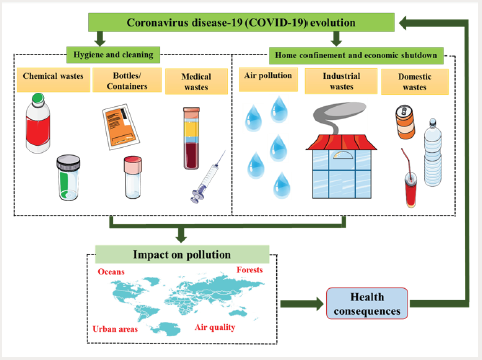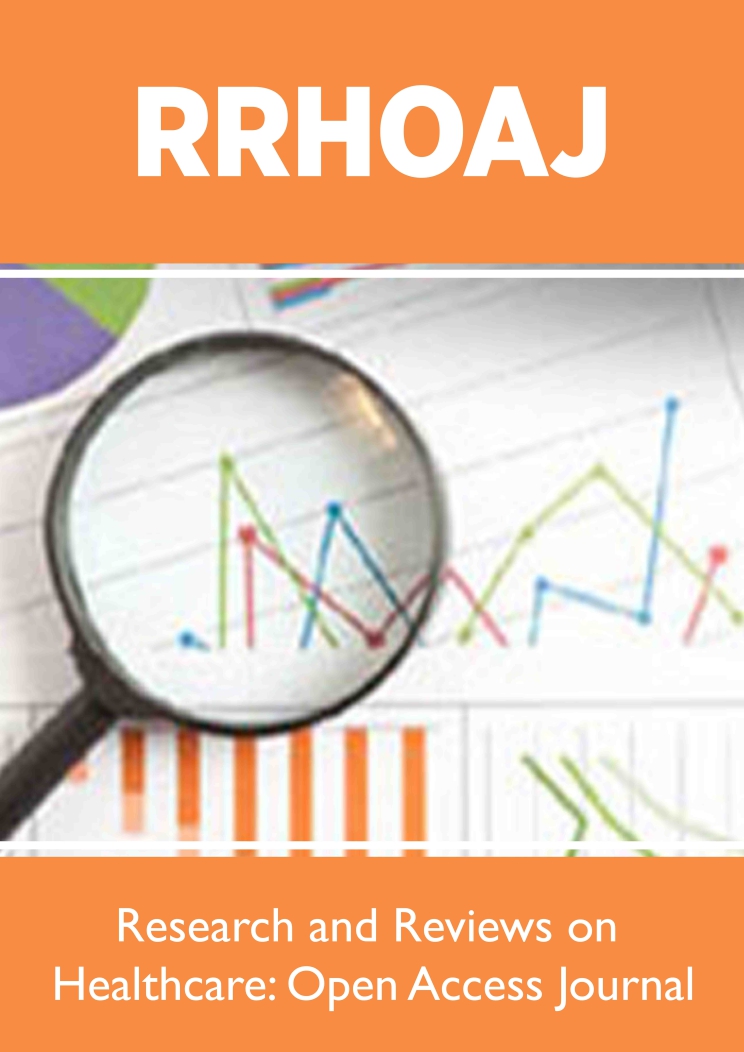
Lupine Publishers Group
Lupine Publishers
Menu
ISSN: 2637-6679
Short Communication(ISSN: 2637-6679) 
Coronavirus Disease-2019 (COVID-19) Crisis: Will It Save Or Pollute the Environment? Volume 5 - Issue 5
Abdelaziz Ghanemi*
- Laval University, Québec , Québec province, G1V 0A6, Canada
Received: September 21, 2020; Published: October 06, 2020
Corresponding author: Abdelaziz Ghanemi, Laval University, 2325, rue de l’Université, Québec (Québec) G1V 0A6 Canada, Email: abdelaziz.ghanemi.1@ulaval.ca
DOI: 10.32474/RRHOAJ.2020.05.000222
Graphical abstract

Keywords:Coronavirus disease-2019 (COVID-19); Pollution
Short Communication
With the ongoing pandemic of coronavirus disease-2019
(COVID-19) and its trend [1] have led to changes at many levels
including chemical industry, tourism, travel, pharmaceutic,
etc. All that is not without consequences on the oceans and the
environment in general (including forests and rivers). Herein, we
discuss to which extend the COVID-19 consequences on different
factors related to the ecological system [2] and life homeostasis in
oceans and on our globe in general. One on the principles practices
recommended by health authorities is the hygiene at all levels,
starting form hand washing and the use of alcoholic gels to surfaces
disinfection and public places cleaning. Therefore, there have been
a significant increase in the use of all the related products including
medical wastes. All these generates a serious amount of chemical
wastes in addition to all what is used for packing those products
such as plastic bottles [3]. In addition, home confinement increases
food consumption and other goods. Furthermore, the psychological
impact of the confinement could also induce more alcohol and
cigarette usage which also increases domestic wastes as well. This
will seriously increase the pollution rates especially that most
countries do not have efficient recycling (both for chemicals and
materials) which is worsen by the slowdown of divers activities
including those of the recycling stations.
Ironically, increase pollution might worsen medical COVID-19
impact on the polluted region [4]. Furthermore, the pollution leads
to develop or worsen numerous diseases [5, 6] such as which would
increase the vulnerability to the individuals to a number of diseases
such as COVID-19 itself. On the other hand, other signs of pollution
(such as air pollution) have been reported to significantly decrease
following the economic lock down and the home confinements
that lead to an industrial waste and gas (that results from industry
and transport). This lead to a “purification” of the air via reducing
air pollution [7]. Indeed, suspended air traffic, road traffic,
individuals working from home has reduced the emissions. The
final environmental impact would not only depend on how these
two directions (those reducing pollution and those increasing it)
go but also for how long the situation will remain. In fact, with
the restart of the economy is some countries that have overcome
the critical phase of COVID-19, it is expected that the industrial
wastes and emissions will quickly increase since the activities will
resume with an increases power in order to make up the period
of the industrial shutdown. Therefore, could come back in a more
severe form. However, the effect of COVID-19 on the environment
including the fats air quality improvement [8, 9] leaves us with a
hope that there is still time to save the planet and faster that we
could imagine if the right decisions are taken. This is of a particular
importance especially after we have seen what we are able to do
and we can scape in our daily lives among what we thought to be
required.
Potential Conflicts of Interest
None (The author declares that there is no conflict of interests)
Acknowledgement
Abdelaziz Ghanemi is a recipient of a Merit scholarship program for foreign students from the Ministry of Education and Higher Education of Quebec, Canada, The Fonds de recherche du Québec – Nature et technologies (FRQNT) is responsible for managing the program (Bourses d’excellence pour étudiants étrangers du Ministère de l’Éducation et de l’Enseignement supérieur du Québec, Le Fonds de recherche du Québec - Nature et technologies (FRQNT) est responsable de la gestion du programme). The graphical abstract was created using images from: http://smart.servier. com. Servier Medical Art by Servier is licensed under a Creative Commons Attribution 3.0 Unported License and Scidraw.io.
References
- Kannan S (2020) COVID-19 (Novel Coronavirus 2019) - recent trends. Eur Rev Med Pharmacol Sci 24(4): 2006-2011.
- Dutheil F, JS Baker, VNavel (2020)COVID-19 as a factor influencing air pollution? Environ Pollut 263(Pt A): pp.114466.
- Rhodes CJ (2018) Plastic pollution and potential solutions. Sci Prog 101(3): 207-260.
- Frontera A (2020) Severe air pollution links to higher mortality in COVID-19 patients: The "double-hit" hypothesis. J Infect 81(2): 255-259.
- Kim KH, E Kabir, S Kabir (2015) A review on the human health impact of airborne particulate matter. Environ Int 74: 136-143.
- Nigra AE (2016) Environmental Metals and Cardiovascular Disease in Adults: A Systematic Review Beyond Lead and Cadmium. Curr Environ Health Rep 3(4): 416-433.
- Muhammad S, X Long, M Salman (2020) COVID-19 pandemic and environmental pollution: A blessing in disguise? Sci Total Environ 728: pp. 138820.
- Mahato S, S Pal,KG Ghosh (2020) Effect of lockdown amid COVID-19 pandemic on air quality of the megacity Delhi, India. Sci Total Environ 730: pp.139086.
- Li L (2020) Air quality changes during the COVID-19 lockdown over the Yangtze River Delta Region: An insight into the impact of human activity pattern changes on air pollution variation. Sci Total Environ, 732: pp.139282.

Top Editors
-

Mark E Smith
Bio chemistry
University of Texas Medical Branch, USA -

Lawrence A Presley
Department of Criminal Justice
Liberty University, USA -

Thomas W Miller
Department of Psychiatry
University of Kentucky, USA -

Gjumrakch Aliev
Department of Medicine
Gally International Biomedical Research & Consulting LLC, USA -

Christopher Bryant
Department of Urbanisation and Agricultural
Montreal university, USA -

Robert William Frare
Oral & Maxillofacial Pathology
New York University, USA -

Rudolph Modesto Navari
Gastroenterology and Hepatology
University of Alabama, UK -

Andrew Hague
Department of Medicine
Universities of Bradford, UK -

George Gregory Buttigieg
Maltese College of Obstetrics and Gynaecology, Europe -

Chen-Hsiung Yeh
Oncology
Circulogene Theranostics, England -
.png)
Emilio Bucio-Carrillo
Radiation Chemistry
National University of Mexico, USA -
.jpg)
Casey J Grenier
Analytical Chemistry
Wentworth Institute of Technology, USA -
Hany Atalah
Minimally Invasive Surgery
Mercer University school of Medicine, USA -

Abu-Hussein Muhamad
Pediatric Dentistry
University of Athens , Greece

The annual scholar awards from Lupine Publishers honor a selected number Read More...

.png)


